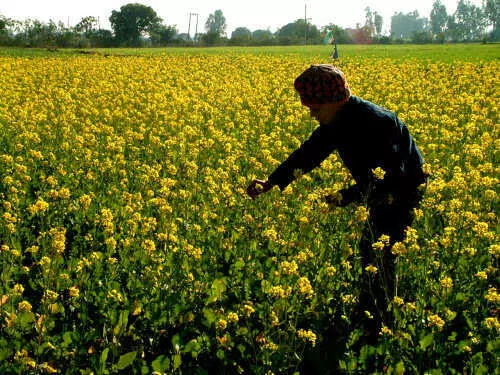
The corporate eye on the mustard
text_fieldsThe central government is preparing for a crucial agricultural experiment by completely ignoring the concerns of the scientific community and the farmers of the country. The Genetic Engineering Approval Committee (GEAC) under the Union Ministry of Environment has approved the commercial use of genetically modified mustard (GM mustard). Although the cultivation of GM crops was approved 20 years ago, this is the first time that a food crop has been approved for commercial cultivation. The GM seed 'Dhara Mustard Hybrid 11' developed by hybridizing the Indian mustard variety 'Varuna' with another mustard variety from Eastern Europe is the one that is about to hit the market. Biosafety testing of this seed had already started in 2008. In 2016, commercial cultivation of the crop was allowed in light of various reports. But the Centre had to withdraw from it due to court intervention and strong protests by some researchers in the field of biotechnology, farmers, and environmental activists. Now, the GEAC's approval is based on the same reports and recommendations that were the basis for the approval then. Naturally, this reverse reform of biotechnology will only serve to double the woes of the country's farming community, who have has been facing major setbacks for various reasons. That's vouched by the experience hitherto. Maybe that's why huge protests have erupted after the approval came in.
Genetic engineering is one of the most powerful technologies of the 20th century. Drugs including insulin became available at low cost as a result of this technology. The key is that it not only becomes available at a low price, but also preserves the natural resources used to produce it. Our country has also made great strides in this field. It is the land of world-famous researchers like Pushpa M Bhargava. Countless laboratories in the country like the Centre for Cellular and Molecular Biology in Hyderabad were established due to the efforts of people like him. Thanks to it, India was able to contribute geniuses like KSN Prasad to the world. Dr. Prasad and his team developed the first GM product in the country - the Hepatitis B vaccine. With that, the vaccine became available to Indians at half the price. This also shows the science and technology policy of the country. Interestingly, even biotech enthusiasts like Dr. Bhargava were not in favor of genetically modified crops and alternative plants. While making the most of the advantages of biotechnology and genetic engineering, they were also willing to constantly expose their dangerous side. That is why he has been at the forefront of the farmers' struggle against genetically modified cotton, eggplant, etc. He had come up with protests six years ago when GM mustard was granted agricultural permission. He wrote an open letter to the Environment Ministry questioning the government's stand. It is also noteworthy that the GM supporters have not answered the 25 questions raised in it to date.
We have experience before us showing that for plants GM technology can be dangerous. The environmental problems created by water hyacinth, which came here from America along with PL 480 wheat, have already been discussed. The same is the case with BT cotton, which has been approved for commercial production for the first time. Figures show that GM cotton cultivation is a huge loss in rain-fed areas. It should be remembered that two-thirds of cotton cultivation in the country depends on rain water alone. Coupling this fact with the incident in Andhra where hundreds of cattle died after eating cotton plant residues, would shed light on the dangers of GM crops. The answer to the question why no other crop, after cotton, has been given approval for so long, can be found in these experiences. But after a short hiatus, the central government is venturing unhindered. After mustard, there are reports that the cultivation of genetically modified bananas and potatoes will also be allowed. The purpose of this initiative can only be guessed. Modi and his cohorts have opened the doors to the entry of monopolies in the farming sector. Even if there has been a slight setback in the farmers' struggle, it cannot be considered a setback. Whoever controls global food production, they are the true rulers of the world. In order to achieve that control, it is necessary to own the monopoly on the production of seeds and fertilizers. Controversial farm bills and GM mustard are different ways to achieve that. It is imperative to recognize this corporate eye on mustard. In other words, it is time for a new farmers' strike.


















